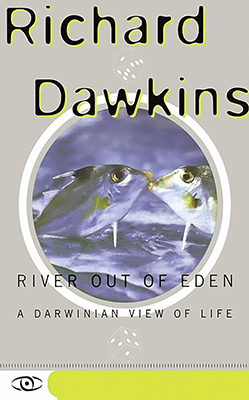
River Out of Eden
River Out of Eden
“River Out of Eden: A Darwinian View of Life” by Richard Dawkins is a thought-provoking exploration of evolution, genetics, and the implications of Darwinian theory for understanding life. The book presents complex scientific ideas in an accessible manner, emphasizing the role of natural selection and the concept of the “selfish gene.” Here’s an extended summary of its key themes and ideas:
Structure and Themes
1. The Gene as the Unit of Selection:
Dawkins argues that genes are the primary units of natural selection. He introduces the idea of the “selfish gene,” positing that genes drive evolutionary processes by promoting behaviors that ensure their own survival and replication. This perspective shifts the focus from individuals and species to the underlying genetic mechanisms.
2. The Concept of Information:
Dawkins discusses the nature of genetic information, likening DNA to a river that flows through generations, carrying the blueprints of life. He explains how genetic variations arise through mutations, and how these variations can lead to evolutionary changes over time.
3. Evolutionary Processes:
The book delves into the mechanisms of evolution, detailing how natural selection operates in various contexts. Dawkins provides examples from the natural world, illustrating how adaptations arise and how species evolve in response to environmental pressures.
4. Memetics:
Dawkins introduces the concept of “memes”—units of cultural evolution analogous to genes. He explores how ideas, behaviors, and cultural phenomena replicate and evolve, drawing parallels between genetic evolution and the transmission of cultural information.
5. Life as a Continuum:
The title “River Out of Eden” reflects Dawkins’s view of life as an interconnected stream of evolution. He emphasizes that all living organisms are linked through common ancestry, stemming from the primordial origins of life. This perspective highlights the unity of life despite its vast diversity.
6. Critique of Creationism:
Dawkins uses the book to argue against creationist views, advocating for a scientific understanding of life’s origins. He provides evidence for evolution through examples from paleontology, comparative anatomy, and genetics, reinforcing the validity of Darwinian theory.
7. Philosophical Implications:
Dawkins reflects on the philosophical implications of a Darwinian worldview, challenging traditional notions of purpose and meaning in life. He suggests that understanding the mechanics of evolution can enrich our appreciation of life, even if it dispels certain romanticized ideas about existence.
8. Human Nature and Behavior:
The author examines how evolutionary theory can explain aspects of human behavior, including altruism, cooperation, and competition. He discusses how genetic predispositions shape social dynamics and individual choices, influencing the course of human history.
Conclusion
“River Out of Eden” serves as a compelling synthesis of evolutionary biology and philosophy, inviting readers to reconsider their understanding of life and its origins. Dawkins’s eloquent prose and clear reasoning make complex scientific concepts accessible, inspiring a deeper appreciation for the intricacies of evolution. Through this work, he aims to instill a sense of wonder about the natural world, emphasizing that the story of life is a continuous river flowing from the distant past to the present.
